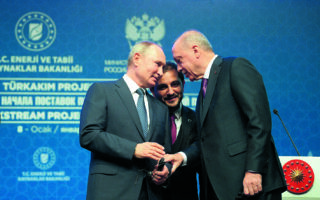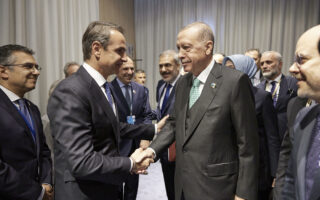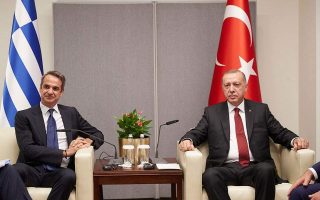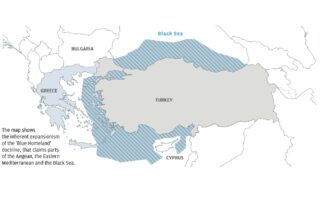Greece-Turkey: The modus operandi and the way ahead

The meeting between Greek Prime Minister Kyriakos Mitsotakis and Turkish President Recep Tayyip Erdogan in Ankara on Monday confirmed the dynamics of the past 14 months, demonstrating that the two leaders have clearly established a modus operandi after restoring relations that have been through a lot of ups and downs since 2019.
The kind of understanding achieved between the two is always useful when it comes to leader-centered regimes like Turkey’s, particularly when it comes time to deal with any serious misunderstandings that may arise. The matter of the marine park that Greece wants to establish in the Aegean Sea (along with another in the Ionian to the west) is indicative of the prevailing climate between Athens and Ankara right now: The issue, which not so long ago could have been blown out of proportion and led to an escalation, was not even brought up by the Turkish side on Monday.
The emphasis, however, continues to be on the so-called positive agenda, which is clearly bearing fruit, both on the matter of containing migrant inflows – with the Greek prime minister stating that Athens would back additional European Union funding to Turkey for this specific issue – as well as on the matter of increasing the number of Turkish tourists visiting the 10 islands of the eastern Aegean benefiting from the new, seven-day express visa scheme. The establishment of a business council headed by two respected personalities can expand the field of cooperation between the two sides further.
In the press conference that followed their talks at the Presidential Palace in Ankara, the two leaders took a cautious stance, with the Turkish president adopting a “political” tone and the Greek prime minister responding succinctly both to the matter of the Greek Muslim minority in Thrace and to the conversion of the Byzantine Monastery of Chora into a mosque, addressing the issues within a very specific legal framework.
The Greek side scored points at the essential and public relations levels, while on the matter of Hamas, Erdogan felt compelled by emotion and his connection to Muslim organizations to respond to the Greek prime minister’s reference to it as a terrorist organization. Both were also addressing an international audience with the statements they chose to make at the press conference.
After having lost in the local elections in March and needing to rally Turkey’s nationalist, Islamist element, Erdogan insisted on describing Hamas as a resistance movement, a position that exposes him in the eyes of the West and Israel. Mitsotakis obviously had the same thought and did not persist with the issue, as the takeaway on the other side of the Atlantic and in the Israeli lobby was that Erdogan once more openly supported a terrorist organization. Mitsotakis, for his part – and as fresh rifts formed with Albania and North Macedonia – was well prepared and, speaking after Erdogan, left nothing unanswered.
On the matter of the conversion of the Church of St Savior in Chora, Erdogan was not apologetic, but he did seek to explain the decision. Inviting the ecumenical patriarch to the formal dinner held for Mitsotakis was a further sign of efforts on the Turkish president’s part to maintain a civil tone and demonstrate religious tolerance.
In any case, Greece has to be prepared for the day when the positive agenda may not be enough to avert a shift in the present dynamic between Athens and Ankara that may be precipitated by Turkey’s unfettered revisionism. To this end, Greece needs a comprehensive review of the current framework of bilateral dialogue – so far restricted to non-divisive issues – which leverages our diplomatic and military capital, as well as our partnerships. This is the only way to change the parameters of the complex equation that defines ties with our neighbor.
Constantinos Filis is an associate professor at the American College of Greece and director of its Institute of Global Affairs.





